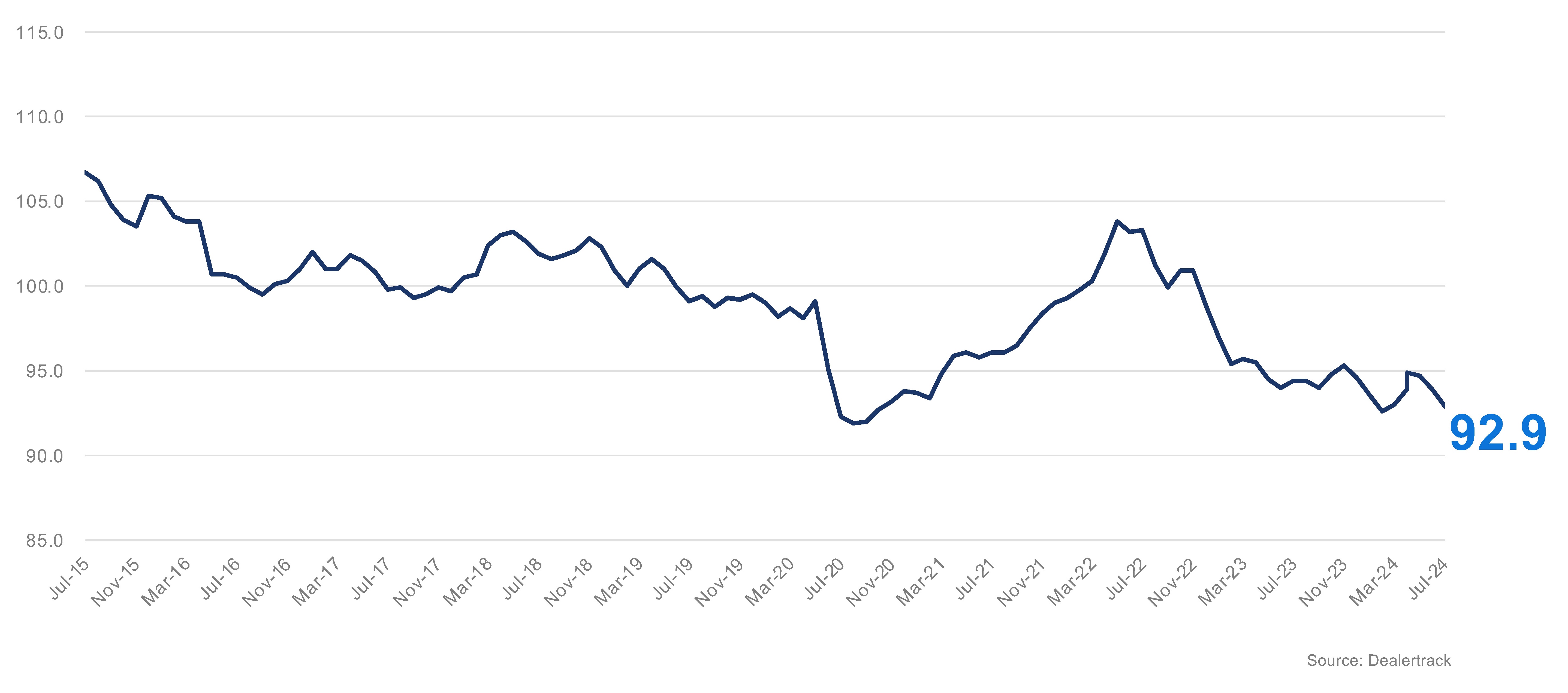Data Point
Auto Credit Availability Declines for Fourth Consecutive Month in July
Monday August 12, 2024
July 2024 marked the fourth consecutive month of auto credit availability decline, with all lender types and channels tightening credit access, according to the Dealertrack Credit Availability Index. The All-Loans Index was 92.9 in July, down 1.0% from a downwardly revised June reading and down 1.5% year over year.
Dealertrack Credit Availability Index1
Auto loan access worsened slightly in July and was down year over year
All Auto Loans Index (Jan2019=100)

The decrease in the index is the result of falling approval rates, reduced subprime share, and increased yield spreads, which make auto credit access more challenging for consumers. The percentage of down payments and term lengths remained unchanged month over month. However, the number of loans with negative equity saw a slight increase and was the only element that positively impacted consumer credit access.
Tightening Credit Across All Sales Channels
July saw a tightening of credit across all sales channels. While new loans that weren’t financed through a captive lender faced the least tightening, used loans financed through franchised dealers saw the most tightening. Credit access was tighter in July than it was a year ago across all channels. Used loans through independent dealers showed the least tightening, and certified pre-owned loans saw the most tightening conditions compared to last year.
Credit Declined Across All Lender Types
All lender types reported a decline in credit availability in July. Banks tightened their credit for the fifth consecutive month, the most significant tightening amongst all lender types since June. Meanwhile, auto-focused finance companies tightened the least and have widened compared to pre-pandemic levels. On a year-over-year basis, the same is true: auto-focused finance companies tightened the least, while banks saw the most tightening.
Increased Yield Spread and Decreased Approval Rates
The average yield spread on auto loans increased by 9 Basis Points (BPs) in July, making rates less attractive to consumers compared to bond yields. The average auto loan rate decreased by 7 BPs in July compared to June, while the 5-year U.S. Treasury decreased by 16 BPs, resulting in a larger average observed yield spread. It is worth noting that we have seen average auto loan rates decrease by 80 BPs since February of this year. Meanwhile, approval rates decreased by 39 BPs in July, representing a 4-percentage point year-over-year decline.
Term Lengths and Down Payments Remained Steady, Negative Equity Increased
The share of loans with terms exceeding 72 months remained steady for the fourth month. However, the number of loans with negative equity increased by 20 BPs in July, following a decrease in June. The down payment percentage was flat from June to July after gradually decreasing since the beginning of the year. However, it has increased by 30 basis points compared to a year ago.
Each Dealertrack Auto Credit Index tracks shifts in loan approval rates, subprime share, yield spreads and loan details, including term length, negative equity, and down payments. The index is baselined to January 2019 to provide a view of how credit access shifts over time.
Measures of Consumer Confidence Mixed in July
The Conference Board Consumer Confidence Index® increased 2.6% in July, as views of the future improved, but views of the present declined. Consumer confidence was down 12.0% year over year for its worst year-over-year performance since July 2022. Plans to purchase a vehicle in the next six months declined compared to June and was lower than in July last year and represented the lowest share of people planning to buy in nine months. According to the sentiment index from the University of Michigan, consumer sentiment declined 2.6% in July compared to June and was down 7.1% year over year. The median consumer expectation for inflation in a year declined to 2.9%, which was the lowest level in four months and matches the lowest level since 2020. The expectation for inflation in five years was steady at 3.0%. The consumer’s view of buying conditions for vehicles declined to the lowest level since December 2022 as the view of interest rates and prices remains very negative. The daily index of consumer sentiment from Morning Consult saw its best month of improvement since February in July as it increased 1.9%, leaving the index up 2.1% year over year. Gas prices declined 0.2% in July as gas prices declined over the last week of the month. The national average price for unleaded gas from AAA was down 0.2% from the end of June to $3.48 per gallon as of July 31, which was down 8% year over year.
The Dealertrack Credit Availability Index is a monthly index based on Dealertrack credit application data and will indicate whether access to auto loan credit is improving or worsening. The index will be published around the 10th of each month.
1In November 2023, the data behind the Dealertrack Auto Credit Availability Index was reset by our data sciences team as part of a migration to a new data management system. All points in the data set were reestablished, with January 2019 in the index set at 100 (as it had been previously). The All-Loans Index plot used in this post utilizes the new data set. The absolute numbers have shifted, but the trends and narrative have not. For more information, contact the Cox Automotive team.
Jonathan Gregory
Jonathan Gregory is a Senior Manager on Cox Automotive’s economic and industry insights team, which works to find actionable insights for the industry posed by Cox Automotive clients. Jonathan works with the Sales, Finance, and Data Science organizations and creates innovative solutions often combining proprietary data from other Cox Automotive brands. Jonathan joined Cox Automotive in 2022.

